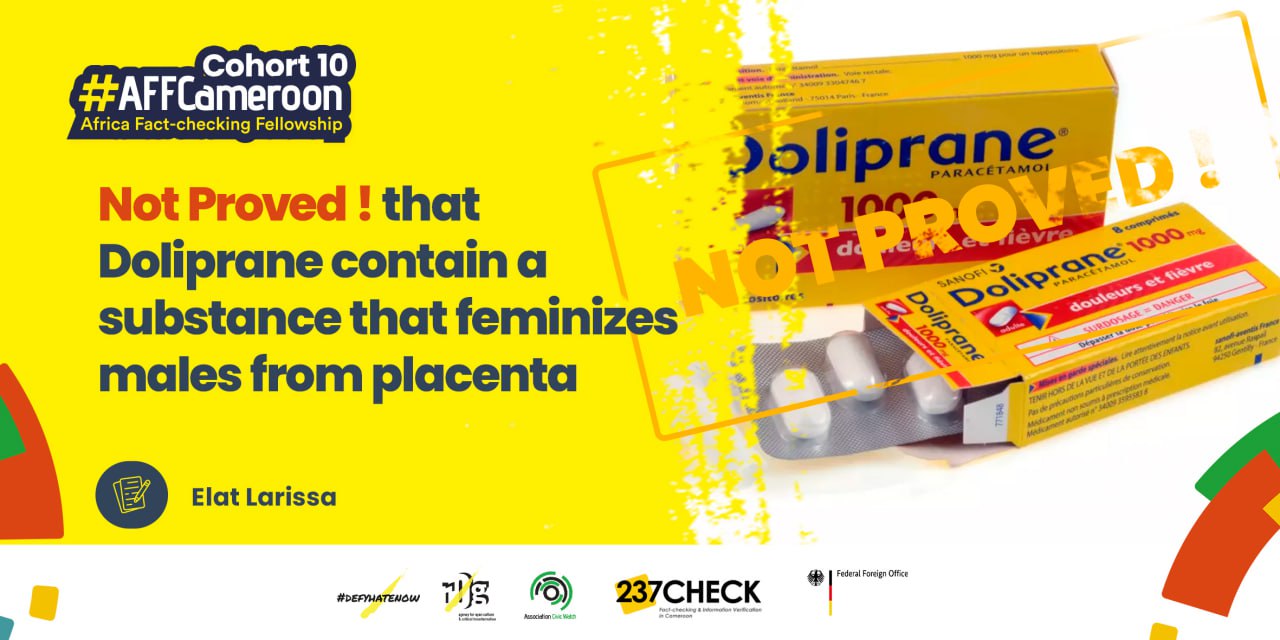On December 4, a claim circulated on X as a comment, alleging that Doliprane, a popular brand of paracetamol “contains a substance which can feminize men”. This claim has sparked considerable concern and confusion particularly on social media. The claim has a reach of 49,200 views in a context where proliferation of medical claims on social media poses significant risks to public health. Misinformation spreads rapidly, leading to delayed diagnosis, misdiagnosis, or inappropriate treatment.
The Claim
The assertion is that Doliprane contains chemicals that interfere with male hormones, leading to “feminization”. According to Science Direct, Feminization occurs when maternally inherited symbionts block the production or action of masculinizing hormones. By causing genetic males to become female.
Also according to https://www.vocabulary.com/dictionary/feminisation, feminization is the process of becoming feminized; the development of female characteristics (loss of facial hair or breast enlargement) in a male because of hormonal disorders or castration.
According to Pharmashopi, Doliprane is a widely marketed brand of paracetamol. It is the same active ingredient as generic paracetamol, but with a specific brand name. Doliprane is available in different forms, such as tablets, capsules, suppositories and syrups, which gives it a wider variety of options for patients. According to PharmaGod (Doliprane 1000 mg comprimé) is reserved for adults and children weighing at least 50 kg or more. The article also warns that exceeding the prescribed dose can destroy the liver
These are some comments and Posts related to the feminization’ effect of Doliprane:




Verification
According to a research carried out by NICS (The National Institute for Clinical Studies), presented in this article “Is paracetamol use in pregnancy harmful for male babies?”, “Taking the painkiller paracetamol in pregnancy for a week or more could potentially have effects on a developing male foetus that is beyond the prescribed use” https://www.theguardian.com/lifeandstyle/2015/may/20/paracetamol-use-pregnancy-male-foetus-testosterone-study . Findings in epidemiological studies also suggest that maternal intake of paracetamol during pregnancy may be associated with male reproductive health. For example, maternal intake of paracetamol during pregnancy has been associated with congenital cryptorchidism, a common male genital birth defect where one or both testes fail to descend into the scrotum. Maternal intake of paracetamol during pregnancy was not clearly associated with biomarkers of male fecundity in adult sons; however, prolonged exposure might impair semen characteristics, warranting further investigation.
There is no reason to think that taking the painkillers for a day could cause any problem, they say – but a study involving a mouse model, grafted with human tissue and given hormones to imitate the state of pregnancy, found the drug lowered testosterone levels over the course of a week.
Pregnant women who take the painkiller paracetamol regularly for long periods may put their unborn sons’ testosterone levels at risk, leading to possible reproductive problems later in life, researchers said. In a study (https://www.analesdepediatria.org) using mice with grafts of human tissue, the scientists found that a week’s paracetamol treatment led to a sharp fall in the production of testosterone, a hormone that is critical to men’s life-long health.
“We would advise that pregnant women should follow current guidance that the painkiller be taken at the lowest effective dose for the shortest possible time,” said Rod Mitchell, a clinical research fellow at Edinburgh University. The study, published in the journal Science Translational Medicine, tested the effect of paracetamol on testosterone production in mice with grafts of human testicular tissue designed to mimic how testes develop and function in pregnancy. Mitchell’s team gave the mice a typical daily dose of paracetamol over a period of either 24 hours or seven days and then measured the amount of testosterone produced by the human tissue an hour after the final dose of paracetamol. After 24 hours of paracetamol treatment, they found no effect on testosterone production, but after seven days of exposure, the amount of testosterone fell by 45 percent.
To find more, we contacted Dr. Charles FOKUNANG P.h.D. in PHYTOPATHOLOGY who has made a scientific contribution worldwide in Phytopathology. He gives his take on whether Doliprane Feminizes Males by saying that Paracetamol (acetaminophen) is the preferred antipyretic/analgesic for pregnant women as it is believed there are no adverse fetal effects at the recommended dose. However, emerging evidence suggests that intrauterine paracetamol exposure may be associated with certain urogenital/reproductive disorders in the offspring. In a mini-review titled Maternal Paracetamol Intake During Pregnancy-Impacts on Offspring Reproductive Development, it describes human fetal sex development and possible pharmacological mechanisms by which paracetamol may disrupt this process, including reduced testicular production of testosterone and/or insulin-like peptide.
We review the available epidemiological literature on associations between maternal paracetamol exposure and offspring sexual development. We focused ourselves on three epidemiological studies :
- “Paracetamol Medication During Pregnancy: Insights on Intake Frequencies, Dosages and Effects on Hematopoietic Stem Cell Populations in Cord Blood From a Longitudinal Prospective Pregnancy Cohort”,
- “Is Maternal Use of Paracetamol during Pregnancy Associated with Anogenital Distance in Male Newborns? The Results from the NELA Birth Cohort”
- Maternal Paracetamol Intake During Pregnancy-Impacts on Offspring Reproductive Development
These studies have reported associations between maternal paracetamol intake and increased risk of cryptorchidism defined by the Oxford dictionary as “a condition in which one or both of the testes fail to descend from the abdomen into the scrotum”. None have found associations with hypospadias or penile length. Two out of three studies have reported a shorter anogenital distance. The first study titled Endometriosis risk is associated with shorter anogenital distance by meta-analysis, and the second “The Relationship between Anogenital Distance, Fatherhood, and Fertility in Adult Men” (a marker of androgen action during the masculinisation programming window, ∼8–14 weeks of gestation) in male infants antenatally exposed to paracetamol. One study has described a dose-dependent relationship between maternal paracetamol consumption and earlier female (but not male) attainment of puberty. Such epidemiological analyses are complicated by various factors, including method of paracetamol exposure assessment (usually retrospective self-report), variation in diagnostic accuracy, selection bias, confounding by clinical indication, and demographic/genetic differences between geographically separated populations. There is an urgent need for stronger evidence in this area, from both relevant experimental studies and large, carefully-designed prospective studies. In the meantime, a precautionary attitude to gestational paracetamol usage should be considered as the evidence for clinically significant reproductive effects in humans is limited ”.
Dr Tata Terence, a medical doctor based in Yaoundé who works with Revoobit International, Sharon Jones Foundation, says “When we talk of feminization, it typically entails the changes in the male secondary sexual characteristics. It involves the changes in hormonal imbalances.”
“Since we are talking about the feminization of the male child, it has to do with the increased estrogen levels and increased testosterone levels. Paracetamol which is found in Doliprane doesn’t cause that. There is no scientific proof that Doliprane causes changes in these hormonal changes when taken normally. We might have cases of overdose or overuse of the product which might lead to a different case altogether. It might lead to liver problems and as a result there will be problems in hormone production but that does not suggest feminization.”
NGONG LANGHA Andy Jones a registered specialized adult nurse at York and Scaborough NHS and Health Writer, author of “The Menstrual Cycle” and Microblogger at Better Health said : “Paracetamol does reduce testosterone levels in vitro (outside the body), especially when used for extended periods and although it may reduce the expression of male sexual characteristics, it does not increase the manifestation of female sexual characteristics”.
Conclusion
An obvious caveat is that as the series of experiments was performed in mice, it is not known what the effect would be in humans. It is also not known whether the effect of regular daily use would be reversible and over what timescale. And we also don’t know whether exposure in pregnancy would actually have any detrimental effects in a male child. There is no evidence that doliprane, a brand of paracetamol, produces fetal complications in animal models, and it is considered a safe drug during pregnancy. For this reason, paracetamol is the first-line analgesic drug used in pregnant women. Paracetamol is the painkiller considered safest for pregnant women. However, researchers investigating reproductive defects in baby boys such as undescended testes say there may be a link between low levels of testosterone and paracetamol intake
Verdict
The claims that Doliprane feminizes male fetuses is not supported by scientific evidence. Available research shows that Doliprane for pregnant women is considered safe unless taken beyond the normal dose. International bodies such as the National Institute of Health (NIH), Science Media Center, have not identified any major risks linked to Doliprane and have not established an acceptable daily intake on its effect on pregnant women.
That said, let us remember that the recommended consumption of paracetamol and other medicines does not present a significant risk to health, provided that these medicines are safe. It is important for consumers to rely on valid scientific information and not to be influenced by unfounded claims spread on social networks.
Elat Larissa, Fellow Cohort 10 #AFFCameroon



